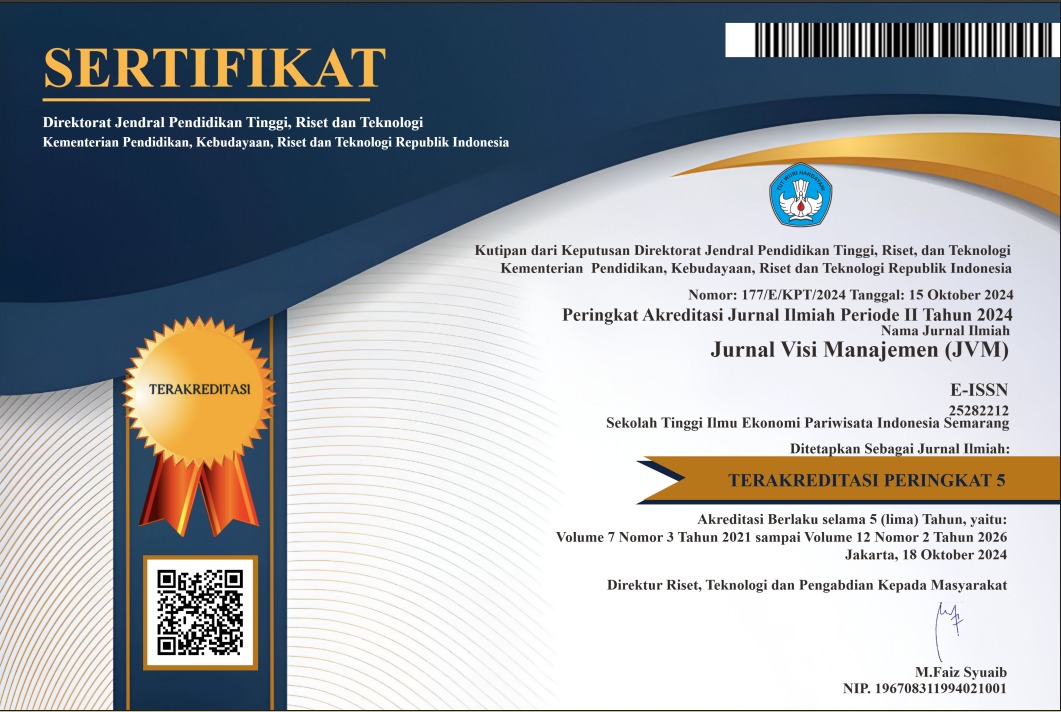Peran Manajemen Keuangan Pribadi Sebagai Variabel Intervening dalam Pengaruh Pengetahuan Keuangan dan Sikap Keuangan Terhadap Kemampuan Menabung (Studi Kasus pada Mahasiswa Akuntansi di Surabaya)
DOI:
https://doi.org/10.56910/jvm.v11i2.538Keywords:
Accounting Students, Financial Attitude, Financial Knowledge, Personal Financial Management, Saving AbilityAbstract
This study aims to analyze the role of personal financial management as an intervening variable in the influence of financial knowledge and financial attitudes on saving ability, for Accounting Study Program students in Surabaya. Using quantitative methods with a survey approach, data were collected through questionnaires distributed to 100 respondents. Data analysis was done by regression and path analysis. The results showed that Financial Knowledge did not have a significant effect on Personal Financial Management, while Financial Attitudes had a positive and significant effect. Financial Knowledge also has no significant effect on Saving Ability, while Financial Attitude has a positive and significant effect. Personal Financial Management has a positive effect on Saving Ability and acts as an intervening variable that strengthens the relationship between Financial Attitude and Saving Ability. This study concludes that Financial Attitude is more influential than Financial Knowledge on Saving Ability. The findings provide insights for educational institutions to focus on developing positive Financial Attitudes and suggest the integration of practical financial education in the curriculum.
References
Agusfianto, N. P., Herawati, N., Fariantin, E., Khotmi, H., Maqsudi, A., Murjana, I. M., Jusmarni, Anwar, Rachmawati, T., Hariyanti, Nuryati, Andayani, S. U., & Nursansiwi, D. A. (2022). Dasar-Dasar Manajemen Keuangan (1st ed.). Seval Literindo Kreasi.
Astawinetu, E. D., & Handini, S. (2020). Manajemen Keuangan Teori dan Praktik. Scopindo Media Pustaka.
Hansen, D. R., & Mowen, M. M. (2013). Akuntansi Manajerial (Buku 1) (8th ed.). Salemba Empat.
Herdjiono, I., & Damanik, L. A. (2016). Pengaruh Financial Attitude,Financial Knowledge, Parental Income Terhadap Financial Management Behavior. Jurnal Manajemen Teori Dan Terapan| Journal of Theory and Applied Management, 9(3), 226–241. https://doi.org/10.20473/jmtt.v9i3.3077
Kholilah, N. Al, & Iramani, R. (2013). Studi Financial Management Behavior Pada Masyarakat Surabaya. Journal of Business and Banking, 3(1), 69. https://doi.org/10.14414/jbb.v3i1.255
Safitri, D., & Naldi, H. (2021). Trend Tema Penulisan Skripsi Ilmu Sejarah 2006-2020 ( Studi Historiografi ). Jurnal Kronologi, 3(4), 141–149. https://doi.org/10.24036/jk.v3i4.298
Senduk, S. (2004). Siapa bilang jadi karyawan ngak bisa kaya; lima kiat praktis mengelola gaji agar bisa kaya. Elex media komputindo.
Siregar, B., Suripto, B., Hapsoro, D., Lo, E. W., & Biyanto, F. (2013). Akuntansi Manajemen (2nd ed.). Salemba Empat.
Sirine, H., & Utami, D. S. (2016). Faktor-Faktor Yang Memengaruhi Perilaku Menabung Di Kalangan Mahasiswa. Jurnal Ekonomi Dan Bisnis, 19(1), 27–52.
Soetiono, K. S., & Setiawan, C. (2018). Literasi dan inklusi keuangan Indonesia (1st ed.). Rajawali Pers.
Yushita, A. N. (2017). Pentingnya Literasi Keuangan Bagi Pengelolaan Keuangan Pribadi. Nominal, Barometer Riset Akuntansi Dan Manajemen, 6(1). https://doi.org/10.21831/nominal.v6i1.14330
Downloads
Published
How to Cite
Issue
Section
License
Copyright (c) 2025 Jurnal Visi Manajemen

This work is licensed under a Creative Commons Attribution-ShareAlike 4.0 International License.







